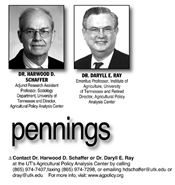|
Job 1 Of The WTO Is To Prevent Dumping

One of the questions we have been asked concerning the APAC/TFU (Agricultural Policy Analysis Center/Texas Farmers Union) farm bill proposal is whether it would comply with the World Trade Organization (WTO) Agreement on Agriculture (AoA) rules that govern agricultural trade. Our quick answer has been that from our perspective if Congress were to adopt the APAC/TFU farm bill proposal (columns 890-897, http://www.agpolicy.org/articles17.htm) for the commodity title of the next farm bill, the US would be in full compliance with its current obligations under the AoA.
At the simplest level, trade rules – including the AoA – are designed to prevent countries from subsidizing industries in a way that allows those industries to dump their products on the world market at a price that is below the full cost of production.
The concern about dumping is not unique to the agricultural sector. In fact, it has been in the news recently because the Trump administration has threatened to place tariffs on steel and aluminum imports into the US. The rationale for this action is, in part, that Chinese steel firms are dumping excess steel production on the world market at prices that are below the full cost of production and that these firms can afford to do that because of the subsidies they receive from the Chinese government.
The second part of the concern over dumping is whether it has a negative impact on domestic industries producing the items that are being sold at prices below the full cost of production. Obviously, countries that do not have steel mills are more than content with being able to import subsidized steel. But, for countries like the US that have seen the shuttering of steel mills over the past few decades because of subsidized imports, dumping is a problem.
What about agriculture? Are agricultural commodities like corn, wheat, cotton, and rice being sold into the export market at prices that are below the US full cost of production? Given our recent analysis of US costs and returns for major crops (columns 906-911, http://www.agpolicy.org/articles18.htm), we would have to answer in the affirmative. Though, our guess is that our export competitors are also selling these agricultural commodities at prices that are below their full cost of production as well.
The second part of the question concerns the role played by the US farm program in allowing this production to continue. Depending on who is doing the calculation, US subsidies could include the payments made under the Agricultural Risk Coverage and Price Loss Coverage programs as well as the subsidies that are provided to encourage US farmers to purchase crop revenue insurance.
The extent to which farmers are able to continue to produce through the loss of equity or refraining from taking any unreimbursed earnings that accrue from returns to land and labor, these values would not be counted toward the dumping calculation.
So, the question of whether or not the APAC/TFU farm bill proposal would be in compliance with AoA rules is a relevant question that has to be analyzed in comparison to the current program and the enhancements to the current programs that are being proposed for the farm bill that is supposed to be voted on this year.
To make those comparisons we need to look at the WTO classification of domestic support programs and the extent to which they contribute to the distortion of production decisions as well as aggregate payment limitations. In addition, we need to look at the rules that are used in establishing whether or not a subsidy for a particular commodity results in significant market distortions that have an adverse impact on other producers.
In coming columns, we will analyze the various WTO criteria and how they apply to the current program, the rumored enhancements to the current programs for the next farm bill, and the APAC/TFU farm bill proposal. ∆
DR. HARWOOD D. SCHAFFER: Adjunct Research Assistant Professor, Sociology Department, University of Tennessee and Director, Agricultural Policy Analysis Center
DR. DARYLL E. RAY: Emeritus Professor, Institute of Agriculture, University of Tennessee and Retired Director, Agricultural Policy Analysis Center
|
|